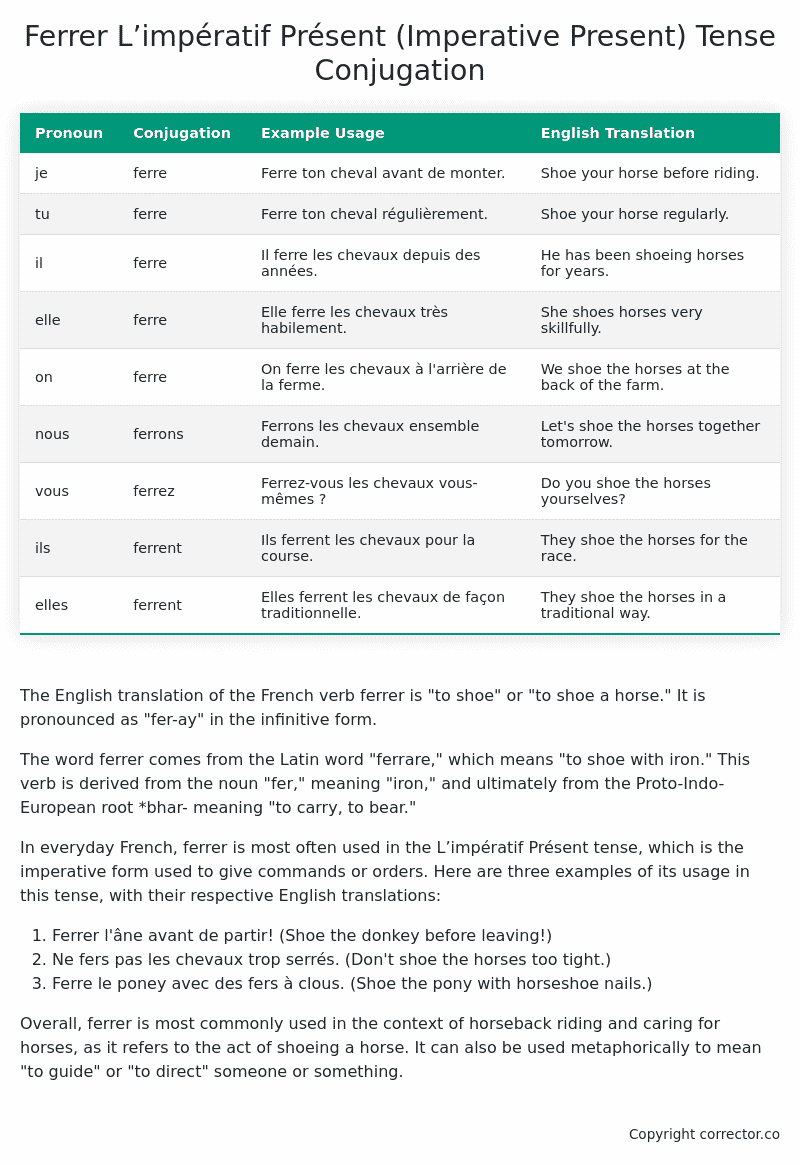L’impératif Présent (Imperative Present) Tense Conjugation of the French Verb ferrer
Introduction to the verb ferrer
The English translation of the French verb ferrer is “to shoe” or “to shoe a horse.” It is pronounced as “fer-ay” in the infinitive form.
The word ferrer comes from the Latin word “ferrare,” which means “to shoe with iron.” This verb is derived from the noun “fer,” meaning “iron,” and ultimately from the Proto-Indo-European root *bhar- meaning “to carry, to bear.”
In everyday French, ferrer is most often used in the L’impératif Présent tense, which is the imperative form used to give commands or orders. Here are three examples of its usage in this tense, with their respective English translations:
- Ferrer l’âne avant de partir! (Shoe the donkey before leaving!)
- Ne fers pas les chevaux trop serrés. (Don’t shoe the horses too tight.)
- Ferre le poney avec des fers à clous. (Shoe the pony with horseshoe nails.)
Overall, ferrer is most commonly used in the context of horseback riding and caring for horses, as it refers to the act of shoeing a horse. It can also be used metaphorically to mean “to guide” or “to direct” someone or something.
Table of the L’impératif Présent (Imperative Present) Tense Conjugation of ferrer
| Pronoun | Conjugation | Example Usage | English Translation |
|---|---|---|---|
| je | ferre | Ferre ton cheval avant de monter. | Shoe your horse before riding. |
| tu | ferre | Ferre ton cheval régulièrement. | Shoe your horse regularly. |
| il | ferre | Il ferre les chevaux depuis des années. | He has been shoeing horses for years. |
| elle | ferre | Elle ferre les chevaux très habilement. | She shoes horses very skillfully. |
| on | ferre | On ferre les chevaux à l’arrière de la ferme. | We shoe the horses at the back of the farm. |
| nous | ferrons | Ferrons les chevaux ensemble demain. | Let’s shoe the horses together tomorrow. |
| vous | ferrez | Ferrez-vous les chevaux vous-mêmes ? | Do you shoe the horses yourselves? |
| ils | ferrent | Ils ferrent les chevaux pour la course. | They shoe the horses for the race. |
| elles | ferrent | Elles ferrent les chevaux de façon traditionnelle. | They shoe the horses in a traditional way. |
Other Conjugations for Ferrer.
Le Present (Present Tense) Conjugation of the French Verb ferrer
Imparfait (Imperfect) Tense Conjugation of the French Verb ferrer
Passé Simple (Simple Past) Tense Conjugation of the French Verb ferrer
Passé Composé (Present Perfect) Tense Conjugation of the French Verb ferrer
Futur Simple (Simple Future) Tense Conjugation of the French Verb ferrer
Futur Proche (Near Future) Tense Conjugation of the French Verb ferrer
Plus-que-parfait (Pluperfect) Tense Conjugation of the French Verb ferrer
Passé Antérieur (Past Anterior) Tense Conjugation of the French Verb ferrer
Futur Antérieur (Future Anterior) Tense Conjugation of the French Verb ferrer
Subjonctif Présent (Subjunctive Present) Tense Conjugation of the French Verb ferrer
Subjonctif Passé (Subjunctive Past) Tense Conjugation of the French Verb ferrer
Subjonctif Imparfait (Subjunctive Imperfect) Tense Conjugation of the French Verb ferrer
Subjonctif Plus-que-parfait (Subjunctive Pluperfect) Tense Conjugation of the French Verb ferrer
Conditionnel Présent (Conditional Present) Tense Conjugation of the French Verb ferrer
Conditionnel Passé (Conditional Past) Tense Conjugation of the French Verb ferrer
L’impératif Présent (Imperative Present) Tense Conjugation of the French Verb ferrer (this article)
L’infinitif Présent (Infinitive Present) Tense Conjugation of the French Verb ferrer
Struggling with French verbs or the language in general? Why not use our free French Grammar Checker – no registration required!
Get a FREE Download Study Sheet of this Conjugation 🔥
Simply right click the image below, click “save image” and get your free reference for the ferrer L’impératif Présent tense conjugation!

Ferrer – About the French L’impératif Présent (Imperative Present) Tense
Usage
Giving commands
Making requests
Offering advice
Expressing desires
Conjugation Formation
Interactions with other tenses
Want More?
I hope you enjoyed this article on the verb ferrer. Still in a learning mood? Check out another TOTALLY random French verb conjugation!


